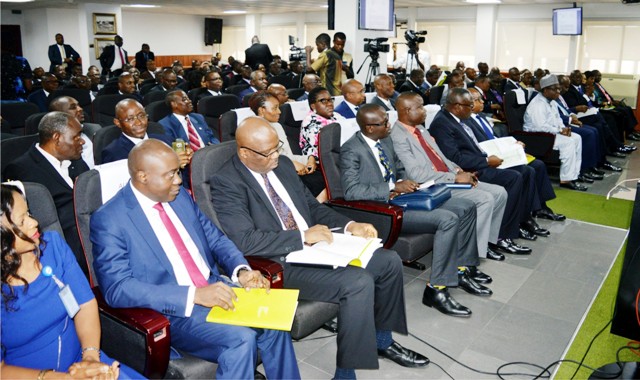Business
Stakeholders Endorse SNEPCo’s Global Nigeria Forum

Public and private sector players in the Nigerian oil and gas industry have described the annual Global Nigeria Forum (GNF) as a model worthy of emulation by the country’s local content regulator.
They spoke at the fourth edition of the forum held in Aberdeen, Scotland with the theme: “Enabling Competitive Local Content Through Sustainable Partnerships”.
The forum, a brainchild of Shell Nigeria Exploration and Production Company (SNEPCo), the deep-water arm of Shell Companies in Nigeria, aims to strengthen local content in offshore exploration by opening the opportunity space to Nigerian professionals in Europe, particularly in the United Kingdom.
In his keynote address, Executive Secretary, Nigeria Content Development and Monitoring Board (NCDMB), Mr. Simbi Wabote, described the annual event as a huge success, according to a statement by Shell Spokesperson, Nigeria, Bamidele Odugbesan, made available to The Tide indicated.
“I am happy to see growth in a partnership that has continued to build capacity without compromising standards,” the statement added.
Chairman of the Local Content Committee of the House of Representatives, Mr Emmanuel Ekong, who led some other members of the National Assembly to the 2017 forum, proposed the takeover of the organisation of the forum by NCDMB.
According to Ekong, saddling the local content agency with the ownership of GNF will ensure ‘inclusion of other international oil companies for greater impact and access to support from the Nigerian parliament’.
“This forum is unique and germane particularly at this time of the low oil price regime, and it aligns with the recent NNPC policy to increase participation of the private sector while attracting the right people with the right technology into the Nigerian oil and gas industry,” said the Exploration Manager, Nigeria National Petroleum Corporation, Mr Marcel Amu, who represented the national oil company.
In his remarks, President of Council for the Regulation of Engineering in Nigeria (COREN), Mr Kashim Ali, pledged the continued support of his organisation to the forum, and asked participants to take advantage of COREN’s new accreditation procedure for Nigerian professionals outside the country.
Reacting to the endorsement of the forum and the successes of the initiative in the last four years, Managing Director of SNEPCo, Mr Bayo Ojulari, acknowledged the support of NNPC, NCDMB, National Petroleum Investment Management Services, and the co-venture partners – Total, NAE and Esso – in the strides by SNEPCo and called for continued support and collaboration to further unleash the country’s huge deep-water potential to build a better Nigeria with stronger economy for now and the future.
Ojulari, who was represented at the forum by SNEPCo’s Acting General Manager, Nigerian Content Development, Mr Austin Uzoka, said, “Nigeria’s deep-water outlook indicates a high volume of activity in the building of FPSOs and drilling of new high performance wells with cutting edge sixth and seventh generation drilling rigs delivering unprecedented schedule optimisation.
SNEPCo obviously has blazed the trail here and would continue its strive to be the best-in-class deep-water energy company generating top-end employment and boosting local capabilities.
“As a Nigerian engineer, nothing makes me happier than seeing indigenous vendors and service providers break new grounds and play up to the international stage in engineering and other seemingly complex jobs.”
Those present at the forum included the Chairman of the House of Representatives Committee on Finance, Mr Jones Onyereri; Chairman of Nigerians in Diaspora (NIDOE) North UK, Dr Paul Eke; General Manager for Contracting and Procurement, Shell Nigeria and Gabon, Mr Antony Ellis and his counterpart for the UK, Mr Anthony Makenna.
Susan Serekara-Nwikhana
Business
Two Federal Agencies Enter Pack On Expansion, Sustainable Electricity In Niger Delta

Business
Why The AI Boom May Extend The Reign Of Natural Gas

Business
Ogun To Join Oil-Producing States ……..As NNPCL Kicks Off Commercial Oil Production At Eba

-

 Politics4 days ago
Politics4 days agoAPC Releases Adjusted Timetable For Nationwide Congresses, Convention
-

 Sports1 day ago
Sports1 day ago2026 WC: Nigeria, DR Congo Awaits FIFA Verdict Today
-
Sports4 days ago
DG NIS Wants NSC Board Constituted, Seeks Increased In Funding
-

 Business4 days ago
Business4 days agoCustoms Seek Support To Curb Smuggling In Ogun
-

 Featured4 days ago
Featured4 days agoINEC Proposes N873.78bn For 2027 Elections, N171bn For 2026 Operations
-

 Sports4 days ago
Sports4 days agoSWAN Rivers Set-up Five Functional Committees
-
Sports4 days ago
NSC Disburses N200m Training Grants To 26 Athletes
-
News4 days ago
Police Bust Kidnapping Syndicate In PH

